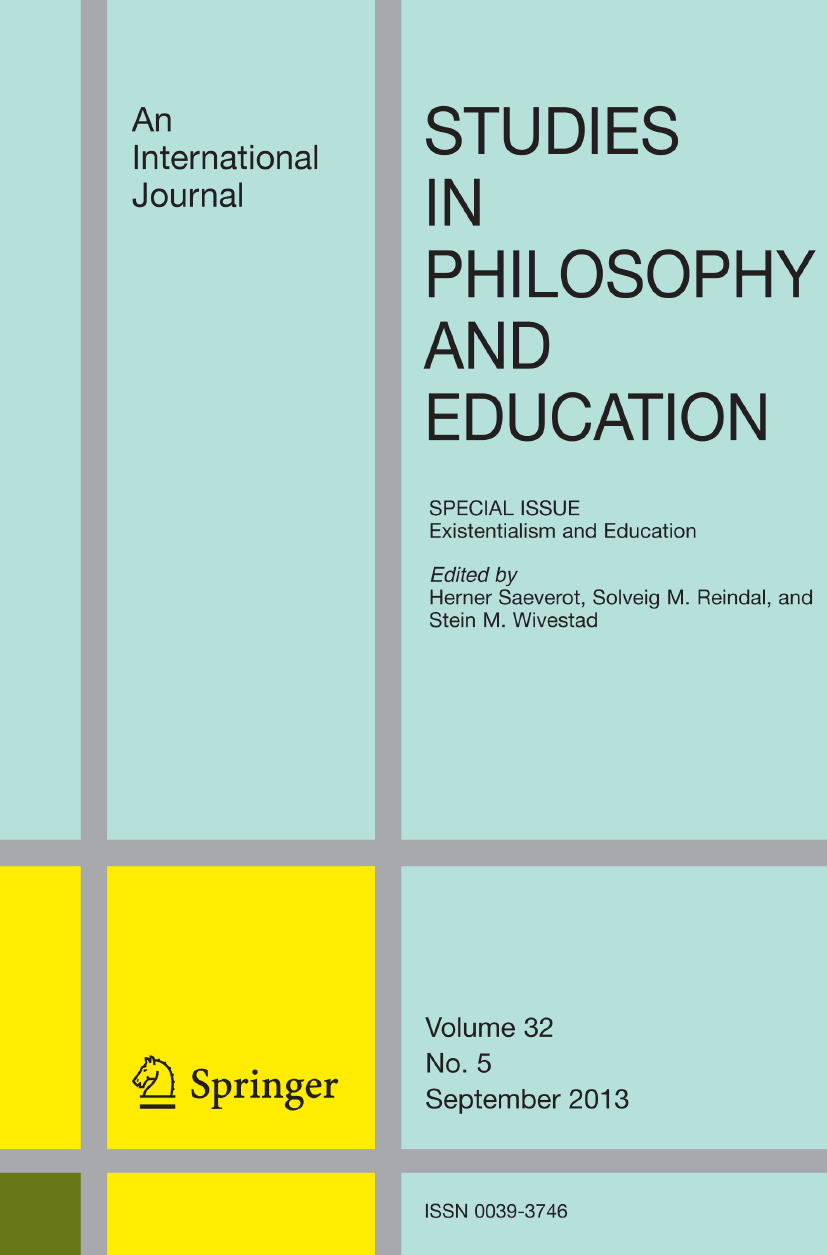dx.doi.org/10.1007/s11217-015-9484-1
Preview meta tags from the dx.doi.org website.
Linked Hostnames
22- 53 links todx.doi.org
- 44 links toscholar.google.com
- 24 links todoi.org
- 16 links tolink.springer.com
- 10 links towww.springernature.com
- 2 links tocitation-needed.springer.com
- 2 links tosupport.springernature.com
- 1 link toauthorservices.springernature.com
Thumbnail

Search Engine Appearance
https://dx.doi.org/10.1007/s11217-015-9484-1
Other People’s Problems: Student Distancing, Epistemic Responsibility, and Injustice - Studies in Philosophy and Education
In classes that examine entrenched injustices like sexism or racism, students sometimes use “distancing strategies” to dissociate themselves fr
Bing
Other People’s Problems: Student Distancing, Epistemic Responsibility, and Injustice - Studies in Philosophy and Education
https://dx.doi.org/10.1007/s11217-015-9484-1
In classes that examine entrenched injustices like sexism or racism, students sometimes use “distancing strategies” to dissociate themselves fr
DuckDuckGo
Other People’s Problems: Student Distancing, Epistemic Responsibility, and Injustice - Studies in Philosophy and Education
In classes that examine entrenched injustices like sexism or racism, students sometimes use “distancing strategies” to dissociate themselves fr
General Meta Tags
110- titleOther People’s Problems: Student Distancing, Epistemic Responsibility, and Injustice | Studies in Philosophy and Education
- charsetUTF-8
- X-UA-CompatibleIE=edge
- applicable-devicepc,mobile
- viewportwidth=device-width, initial-scale=1
Open Graph Meta Tags
6- og:urlhttps://link.springer.com/article/10.1007/s11217-015-9484-1
- og:typearticle
- og:site_nameSpringerLink
- og:titleOther People’s Problems: Student Distancing, Epistemic Responsibility, and Injustice - Studies in Philosophy and Education
- og:descriptionIn classes that examine entrenched injustices like sexism or racism, students sometimes use “distancing strategies” to dissociate themselves from the injustice being studied. Education researchers argue that distancing is a mechanism through which students, especially students of apparent privilege, deny their complicity in systemic injustice. While I am sympathetic to this analysis, I argue that there is much at stake in student distancing that the current literature fails to recognize. On my view, distancing perpetuates socially sanctioned forms of ignorance and unknowing, through which students misrecognize not only their complicity in injustice, but also the ways that injustice shapes the world, their lives, and their knowledge. Thus, distancing is pedagogically problematic because it prevents students from understanding important social facts, and because it prevents them from engaging with perspectives, analyses, and testimonies that might beneficially challenge their settled views and epistemic habits. To substantiate this new analysis, I draw on recent work on epistemologies of ignorance, especially José Medina’s account of “active ignorance.” In order to respond to student distancing, I argue, it is not sufficient for teachers to make students aware of injustice, or of their potential complicity in it. Beyond this, teachers should cultivate epistemic virtue in the classroom and encourage students to take responsibility for better ways of knowing. The article ends by outlining several classroom practices for beginning this work.
Twitter Meta Tags
6- twitter:site@SpringerLink
- twitter:cardsummary_large_image
- twitter:image:altContent cover image
- twitter:titleOther People’s Problems: Student Distancing, Epistemic Responsibility, and Injustice
- twitter:descriptionStudies in Philosophy and Education - In classes that examine entrenched injustices like sexism or racism, students sometimes use “distancing strategies” to dissociate themselves from...
Item Prop Meta Tags
3- position1
- position2
- position3
Link Tags
9- apple-touch-icon/oscar-static/img/favicons/darwin/apple-touch-icon-6ef0829b9c.png
- canonicalhttps://link.springer.com/article/10.1007/s11217-015-9484-1
- icon/oscar-static/img/favicons/darwin/android-chrome-192x192.png
- icon/oscar-static/img/favicons/darwin/favicon-32x32.png
- icon/oscar-static/img/favicons/darwin/favicon-16x16.png
Emails
1Links
166- http://scholar.google.com/scholar_lookup?&title=All%20things%20considered%20duties%20to%20believe&journal=Synthese&doi=10.1007%2Fs11229-010-9857-5&volume=187&pages=509-517&publication_year=2012&author=Booth%2CAnthony%20R
- http://scholar.google.com/scholar_lookup?&title=Argumentation%20step-by-step%3A%20Learning%20critical%20thinking%20through%20deliberate%20practice&journal=Teaching%20Philosophy&doi=10.5840%2Fteachphil20123514&volume=35&issue=1&pages=41-62&publication_year=2012&author=Cahill%2CAnne&author=Bloch-Schulman%2CStephen
- http://scholar.google.com/scholar_lookup?&title=Being%20white%2C%20being%20good%3A%20White%20complicity%2C%20white%20moral%20responsibility%2C%20and%20social%20justice%20pedagogy&publication_year=2010&author=Applebaum%2CBarbara
- http://scholar.google.com/scholar_lookup?&title=Black%20bodies%2C%20white%20gazes%3A%20The%20continuing%20significance%20of%20race&publication_year=2008&author=Yancy%2CGeorge
- http://scholar.google.com/scholar_lookup?&title=Black%20feminist%20thought%3A%20Knowledge%2C%20consciousness%2C%20and%20the%20politics%20of%20empowerment&publication_year=2008&author=Collins%2CPatricia%20H